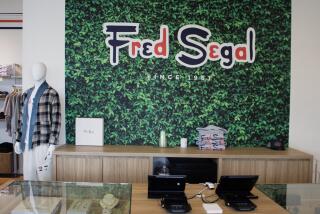PRACTICAL VIEW / Advertising : Who Is It Really?
- Share via
You’re reading the newspaper and suddenly you notice that the Broadway is selling cotton walking shorts by Famous Maker for $16.99; Mervyn’s has Famous Maker dress shirts for $15.99 and May Co. is having a sale on Famous Maker handbags for $22.40.
Just how famous is this maker the department stores refuse to mention by name? Could Calvin Klein be up to something? Is Donna Karan on the lam? Has Ralph Lauren skipped town on his Polo pony?
Asked to identify the elusive designer, a Robinson’s spokesman was not much help. “I’ll have to get clearance from upper management before I can get someone to answer that.”
Clearance? What have we stumbled onto here? Are Bill Clinton or Ross Perot involved?
Actually it’s nothing so clandestine, but it could be a bit political, says Jim Watterson, a spokesman for May Co.
“Basically, we use it when a vendor or designer won’t allow the store to use their name in any kind of discount advertising. Most often it’s used to protect the status or prestige of the product.”
At other times, adds Watterson, the advertising department simply doesn’t know in advance which designer’s merchandise is going to be on sale.
Restrictions on the use of designer names differ from store to store. At May Co. or Mervyn’s, for example, Famous Maker rarely refers to designer products. But at Nordstrom, Bullock’s or the Broadway, occasionally Famous Maker goods will actually be made by a famous maker.
“Usually, Famous Maker refers to branded, well-known designers,” says Pat Turner, a spokeswoman for the Broadway. “For us it means labels like Liz Claiborne, Evan Picone and Jones New York.”
Why not just use the designers’ names? “Because many times the companies are very picky about when they go on sale,” says Turner. The generic verbiage, she says, puts the store back in charge.
More to Read
Inside the business of entertainment
The Wide Shot brings you news, analysis and insights on everything from streaming wars to production — and what it all means for the future.
You may occasionally receive promotional content from the Los Angeles Times.










